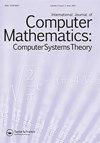一种高效的无信标随机噪声密钥协议
IF 0.6
Q3 COMPUTER SCIENCE, THEORY & METHODS
International Journal of Computer Mathematics: Computer Systems Theory
Pub Date : 2019-10-02
DOI:10.1080/23799927.2019.1671903
引用次数: 0
摘要
计算轻量级和无条件安全的密钥协商协议对于公共网络中的安全通信非常有用,特别是对于计算资源有限的传感器。2017年,Guan和Tseng提出了一种计算轻量级且无条件安全的密钥协议。在他们的协议中,假设两个通信节点可以从信标节点接收随机位串。随机位串在密钥生成中起着重要的作用。随着硬件和软件技术的进步,传感器可能会产生好的随机字符串。在本文中,我们考虑了传感器节点可以为密钥生成随机位串的情况。因此,不需要信标节点。研究结果表明,当通信节点能够生成良好的随机比特串时,密钥协议的有效性和效率将大大提高。本文章由计算机程序翻译,如有差异,请以英文原文为准。
An efficient secret key agreement protocol based on random noise without beacons
ABSTRACT Computationally lightweight and unconditionally secure key agreement protocols are very useful for secure communication in public networks, especially for sensors with limited computing resources. In 2017, Guan and Tseng proposed a key agreement protocol which is computationally lightweight and unconditionally secure. In their protocol, it was assumed that the two communicating nodes can receive random bit string from a beacon node. Random bit string plays an important role in the generation of secret keys. With the advancement of hardware and software technologies, sensors may be able to generate good random strings. In this paper, we consider the case that the sensor nodes can generate random bit strings for secret keys. Therefore, no beacon nodes are required. The results of this study show that a key agreement protocol can be much more effective and efficient in the case that the communicating nodes can generate good random bit strings.
求助全文
通过发布文献求助,成功后即可免费获取论文全文。
去求助
来源期刊

International Journal of Computer Mathematics: Computer Systems Theory
Computer Science-Computational Theory and Mathematics
CiteScore
1.80
自引率
0.00%
发文量
11
 求助内容:
求助内容: 应助结果提醒方式:
应助结果提醒方式:


